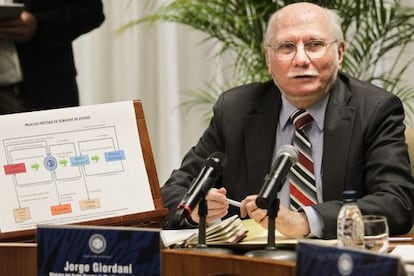Maduro dismisses Venezuela’s economic policy czar
Long-time Chávez mentor Jorge Giordani hits back with article criticizing government

Venezuelan President Nicolás Maduro has decided to reshuffle his cabinet. The most notable departure is Jorge Giordani, the minister of planning who mentored late President Hugo Chávez and has been responsible for government economic policy for the last 15 years. He will be replaced by Ricardo Menéndez, who previously served as minister for higher education. Four hours after the announcement on the radio-television program En contacto con Maduro, Giordani published an article on chavista website Aporrea in which he sharply criticized the leadership of the Venezuelan government and got even with his former colleagues.
These changes come just five weeks before the United Socialist Party of Venezuela holds its conference, where Maduro’s leadership is expected to be ratified.
In his article, Giordani reveals what was – until now – only a water-cooler rumor and an opinion of some analysts: the fact that there are big structural differences between the various groups that emerged after Chávez’s death. Giordani does not hold back. He criticizes the administration for excessive spending, for imitating the communication style of the late president, for “superimposing ignorance of economics on top of political will,” and “the meddling French advice that had nothing to do with the country’s situation.”
Giordani’s article confirms the rumor that there are big structural differences between the groups that emerged after Chávez’s death
Giordani mentions two of Maduro’s closest advisors during the first few months of his administration, who also worked with him when he was Chávez’s foreign secretary. They are Temir Porras, who was president of Venezuela’s economic development bank before leaving the government, and Max Arveláez, who was named ambassador to Washington D.C..
Some analysts have commented on Giordani’s article on social media, saying it offers no self-critique despite the calamitous state in which he left the economy after trying to implement a system that would make the state the key player in the import business.
The circulation of foreign currency at preferential rates created a system that fostered the formation of certain power groups. These clusters forced the president to take more and more power away from Giordani. His departure is in fact a formality, given that Maduro gave the post to Rafael Ramírez, the president of state-run oil holding Petróleos de Venezuela (Pdvsa). Ramírez was a great opponent to Giordani’s macroeconomic policies.
Giordani refers to Ramírez in his article without mentioning his name. He also talks about how he was gradually excluded from the inner circle that made the decisions after Chávez’s death. “The institutions that were once under the comandante’s control began to show signs of independence that worsened as contributions to the treasury fell – a consequence of the independence of Pdvsa’s administrative body, which was motivated by its own interests and problems, and spending decisions made without fiscal oversight. These factors worsened the financial situation in the country as it was experiencing a destabilizing campaign within and isolation without.”
It is painful and alarming to see a president who shows no leadership”
Giordani wanted to reduce public spending after the ardurous October 2012 presidential campaign that won Chávez his third term. He wrote a letter to Maduro asking to be named president of Cadivi, the now defunct body that oversaw the management of the subsidized dollar. The president declined his request but he agreed to another proposal. Following Giordani’s advice, Maduro established a special committee to oversee the use of government-controlled currencies in importing basic goods. It was a technique designed to prevent a maneuver Giordani himself had denounced – falsifying import records using the American dollar made available at an artificially low price. But, spending continued apace because Maduro, whose popularity in the polls has been falling sharply since the beginning of the year, could not make any cuts. The so-called “government of the street” – the presidential initiative that sends cabinet members to the most remote corners of the country to resolve operational problems, was a decision made “without prior consideration or preparation.”
The article portrays Maduro as a man trying to negotiate his vision of how to govern an oil-state with various opposing groups. This ambiguity has made Giordani doubt the president’s abilities. In the final lines of the article the former official said: “It is painful and alarming to see a president who shows no leadership.” This was a message clearly addressed to the delegates who will participate in the party’s July conference. The stormy nature of this movement, whose antagonistic groups had gathered around one person, begins to emerge as the party gets ready to renew itself.
Translation: Dyane Jean François
Tu suscripción se está usando en otro dispositivo
¿Quieres añadir otro usuario a tu suscripción?
Si continúas leyendo en este dispositivo, no se podrá leer en el otro.
FlechaTu suscripción se está usando en otro dispositivo y solo puedes acceder a EL PAÍS desde un dispositivo a la vez.
Si quieres compartir tu cuenta, cambia tu suscripción a la modalidad Premium, así podrás añadir otro usuario. Cada uno accederá con su propia cuenta de email, lo que os permitirá personalizar vuestra experiencia en EL PAÍS.
¿Tienes una suscripción de empresa? Accede aquí para contratar más cuentas.
En el caso de no saber quién está usando tu cuenta, te recomendamos cambiar tu contraseña aquí.
Si decides continuar compartiendo tu cuenta, este mensaje se mostrará en tu dispositivo y en el de la otra persona que está usando tu cuenta de forma indefinida, afectando a tu experiencia de lectura. Puedes consultar aquí los términos y condiciones de la suscripción digital.








































